Managerial Incentives and Their Impact on Accounting Method Selection
VerifiedAdded on 2023/05/28
|5
|1291
|336
Essay
AI Summary
This report examines the impact of managerial incentives on the selection of accounting methods, focusing on how incentives and compensation motivate business executives to choose accounting practices that maximize profitability. It critically evaluates these managerial choices in relation to normative accounting theory, highlighting the role of earnings management and its potential negative impacts on financial decisions. The analysis incorporates positive accounting theory and agency theory to explain how managers' self-interests and bonus plans drive accounting method selection. It also contrasts these motivations with the principles of normative accounting theory, which emphasizes theoretical principles over practical considerations. The report concludes that incentive policies significantly determine the selection of accounting methods, particularly when remuneration is linked to a firm's accounting performance.
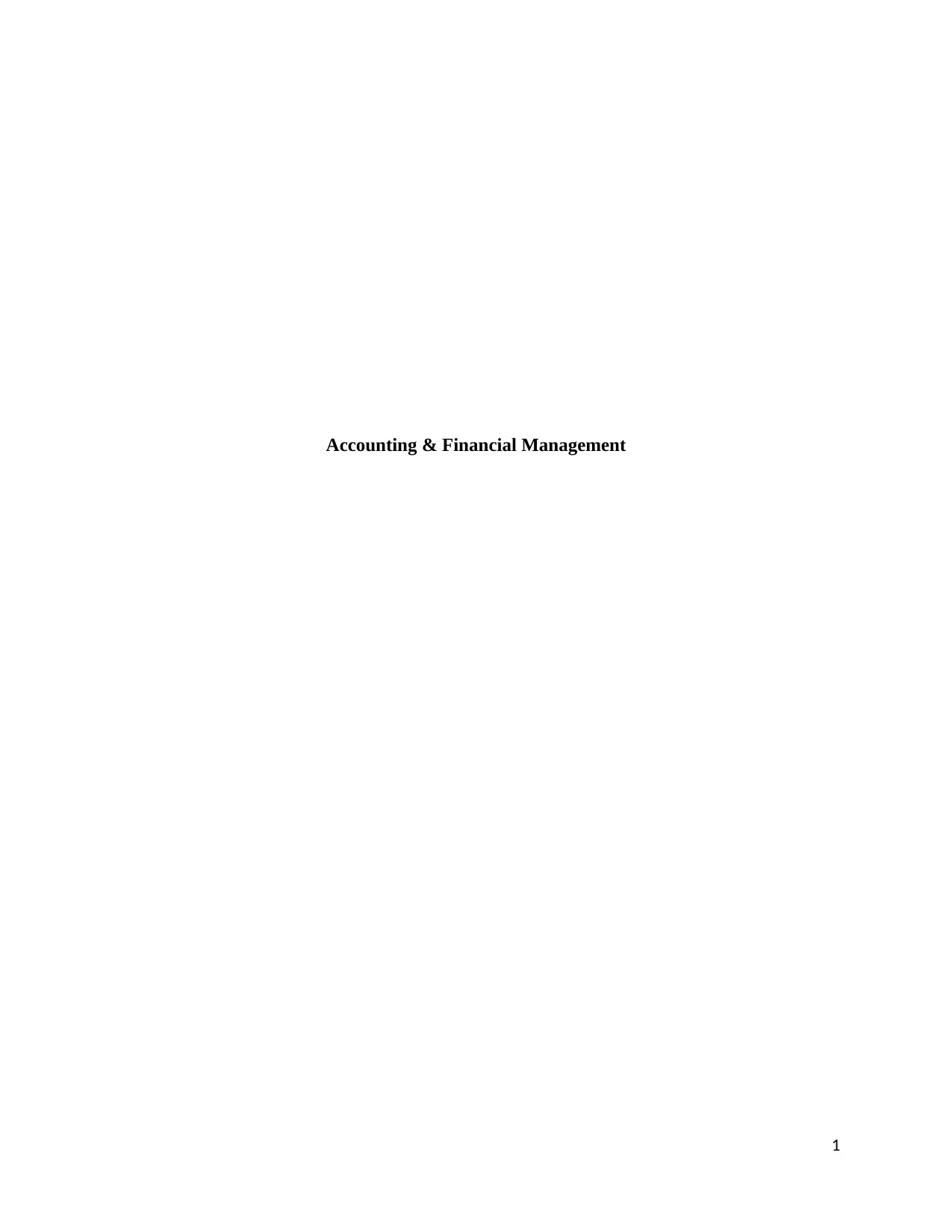
Accounting & Financial Management
1
1
Paraphrase This Document
Need a fresh take? Get an instant paraphrase of this document with our AI Paraphraser
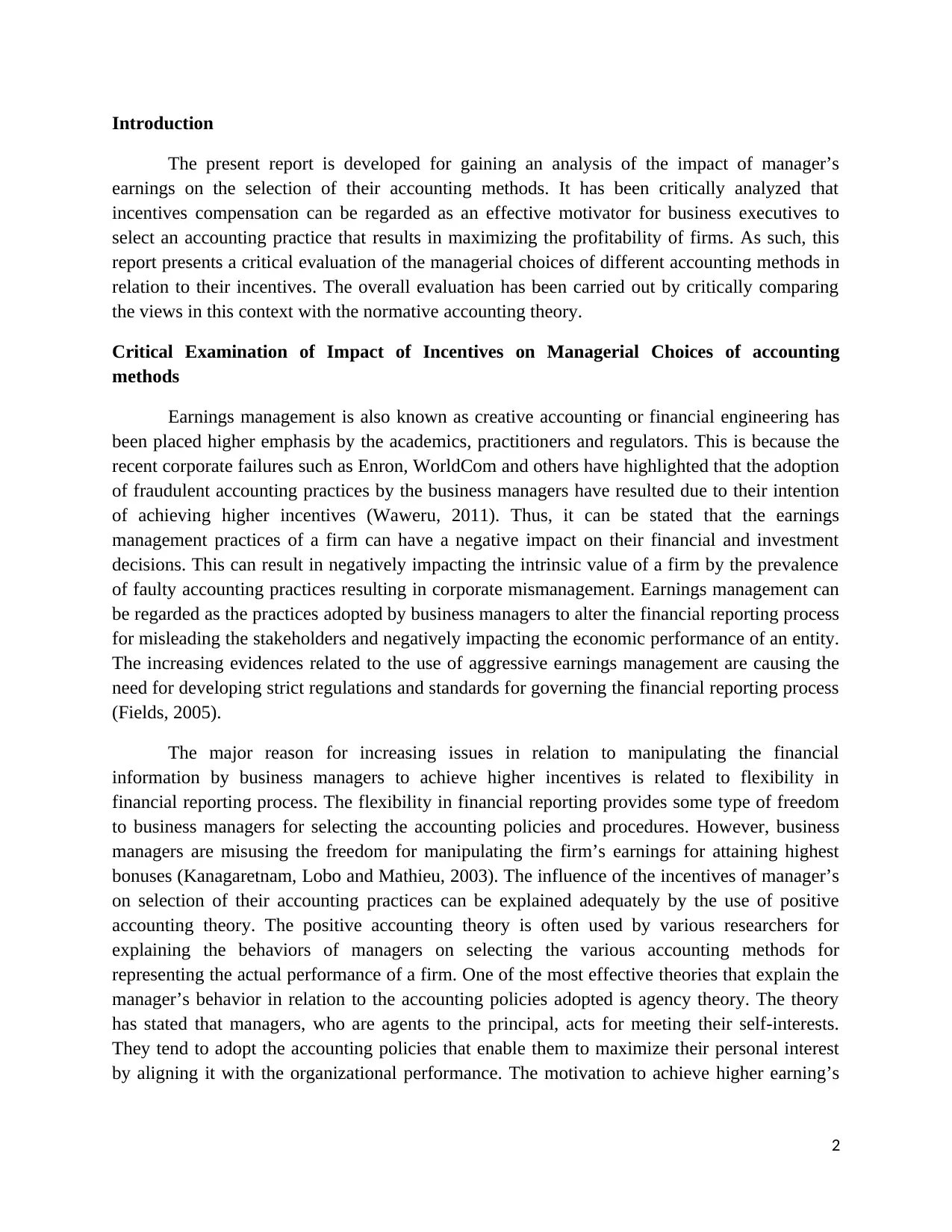
Introduction
The present report is developed for gaining an analysis of the impact of manager’s
earnings on the selection of their accounting methods. It has been critically analyzed that
incentives compensation can be regarded as an effective motivator for business executives to
select an accounting practice that results in maximizing the profitability of firms. As such, this
report presents a critical evaluation of the managerial choices of different accounting methods in
relation to their incentives. The overall evaluation has been carried out by critically comparing
the views in this context with the normative accounting theory.
Critical Examination of Impact of Incentives on Managerial Choices of accounting
methods
Earnings management is also known as creative accounting or financial engineering has
been placed higher emphasis by the academics, practitioners and regulators. This is because the
recent corporate failures such as Enron, WorldCom and others have highlighted that the adoption
of fraudulent accounting practices by the business managers have resulted due to their intention
of achieving higher incentives (Waweru, 2011). Thus, it can be stated that the earnings
management practices of a firm can have a negative impact on their financial and investment
decisions. This can result in negatively impacting the intrinsic value of a firm by the prevalence
of faulty accounting practices resulting in corporate mismanagement. Earnings management can
be regarded as the practices adopted by business managers to alter the financial reporting process
for misleading the stakeholders and negatively impacting the economic performance of an entity.
The increasing evidences related to the use of aggressive earnings management are causing the
need for developing strict regulations and standards for governing the financial reporting process
(Fields, 2005).
The major reason for increasing issues in relation to manipulating the financial
information by business managers to achieve higher incentives is related to flexibility in
financial reporting process. The flexibility in financial reporting provides some type of freedom
to business managers for selecting the accounting policies and procedures. However, business
managers are misusing the freedom for manipulating the firm’s earnings for attaining highest
bonuses (Kanagaretnam, Lobo and Mathieu, 2003). The influence of the incentives of manager’s
on selection of their accounting practices can be explained adequately by the use of positive
accounting theory. The positive accounting theory is often used by various researchers for
explaining the behaviors of managers on selecting the various accounting methods for
representing the actual performance of a firm. One of the most effective theories that explain the
manager’s behavior in relation to the accounting policies adopted is agency theory. The theory
has stated that managers, who are agents to the principal, acts for meeting their self-interests.
They tend to adopt the accounting policies that enable them to maximize their personal interest
by aligning it with the organizational performance. The motivation to achieve higher earning’s
2
The present report is developed for gaining an analysis of the impact of manager’s
earnings on the selection of their accounting methods. It has been critically analyzed that
incentives compensation can be regarded as an effective motivator for business executives to
select an accounting practice that results in maximizing the profitability of firms. As such, this
report presents a critical evaluation of the managerial choices of different accounting methods in
relation to their incentives. The overall evaluation has been carried out by critically comparing
the views in this context with the normative accounting theory.
Critical Examination of Impact of Incentives on Managerial Choices of accounting
methods
Earnings management is also known as creative accounting or financial engineering has
been placed higher emphasis by the academics, practitioners and regulators. This is because the
recent corporate failures such as Enron, WorldCom and others have highlighted that the adoption
of fraudulent accounting practices by the business managers have resulted due to their intention
of achieving higher incentives (Waweru, 2011). Thus, it can be stated that the earnings
management practices of a firm can have a negative impact on their financial and investment
decisions. This can result in negatively impacting the intrinsic value of a firm by the prevalence
of faulty accounting practices resulting in corporate mismanagement. Earnings management can
be regarded as the practices adopted by business managers to alter the financial reporting process
for misleading the stakeholders and negatively impacting the economic performance of an entity.
The increasing evidences related to the use of aggressive earnings management are causing the
need for developing strict regulations and standards for governing the financial reporting process
(Fields, 2005).
The major reason for increasing issues in relation to manipulating the financial
information by business managers to achieve higher incentives is related to flexibility in
financial reporting process. The flexibility in financial reporting provides some type of freedom
to business managers for selecting the accounting policies and procedures. However, business
managers are misusing the freedom for manipulating the firm’s earnings for attaining highest
bonuses (Kanagaretnam, Lobo and Mathieu, 2003). The influence of the incentives of manager’s
on selection of their accounting practices can be explained adequately by the use of positive
accounting theory. The positive accounting theory is often used by various researchers for
explaining the behaviors of managers on selecting the various accounting methods for
representing the actual performance of a firm. One of the most effective theories that explain the
manager’s behavior in relation to the accounting policies adopted is agency theory. The theory
has stated that managers, who are agents to the principal, acts for meeting their self-interests.
They tend to adopt the accounting policies that enable them to maximize their personal interest
by aligning it with the organizational performance. The motivation to achieve higher earning’s
2
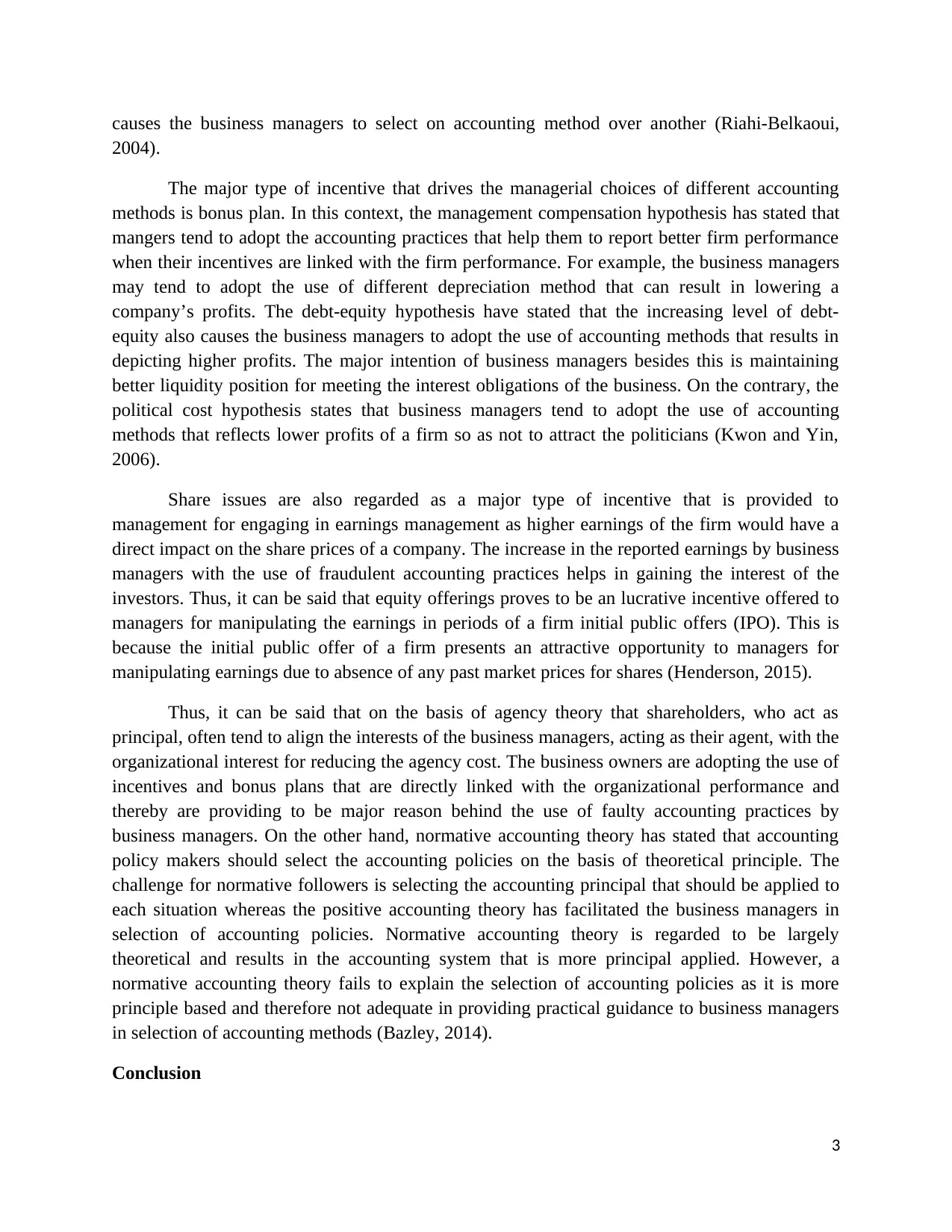
causes the business managers to select on accounting method over another (Riahi-Belkaoui,
2004).
The major type of incentive that drives the managerial choices of different accounting
methods is bonus plan. In this context, the management compensation hypothesis has stated that
mangers tend to adopt the accounting practices that help them to report better firm performance
when their incentives are linked with the firm performance. For example, the business managers
may tend to adopt the use of different depreciation method that can result in lowering a
company’s profits. The debt-equity hypothesis have stated that the increasing level of debt-
equity also causes the business managers to adopt the use of accounting methods that results in
depicting higher profits. The major intention of business managers besides this is maintaining
better liquidity position for meeting the interest obligations of the business. On the contrary, the
political cost hypothesis states that business managers tend to adopt the use of accounting
methods that reflects lower profits of a firm so as not to attract the politicians (Kwon and Yin,
2006).
Share issues are also regarded as a major type of incentive that is provided to
management for engaging in earnings management as higher earnings of the firm would have a
direct impact on the share prices of a company. The increase in the reported earnings by business
managers with the use of fraudulent accounting practices helps in gaining the interest of the
investors. Thus, it can be said that equity offerings proves to be an lucrative incentive offered to
managers for manipulating the earnings in periods of a firm initial public offers (IPO). This is
because the initial public offer of a firm presents an attractive opportunity to managers for
manipulating earnings due to absence of any past market prices for shares (Henderson, 2015).
Thus, it can be said that on the basis of agency theory that shareholders, who act as
principal, often tend to align the interests of the business managers, acting as their agent, with the
organizational interest for reducing the agency cost. The business owners are adopting the use of
incentives and bonus plans that are directly linked with the organizational performance and
thereby are providing to be major reason behind the use of faulty accounting practices by
business managers. On the other hand, normative accounting theory has stated that accounting
policy makers should select the accounting policies on the basis of theoretical principle. The
challenge for normative followers is selecting the accounting principal that should be applied to
each situation whereas the positive accounting theory has facilitated the business managers in
selection of accounting policies. Normative accounting theory is regarded to be largely
theoretical and results in the accounting system that is more principal applied. However, a
normative accounting theory fails to explain the selection of accounting policies as it is more
principle based and therefore not adequate in providing practical guidance to business managers
in selection of accounting methods (Bazley, 2014).
Conclusion
3
2004).
The major type of incentive that drives the managerial choices of different accounting
methods is bonus plan. In this context, the management compensation hypothesis has stated that
mangers tend to adopt the accounting practices that help them to report better firm performance
when their incentives are linked with the firm performance. For example, the business managers
may tend to adopt the use of different depreciation method that can result in lowering a
company’s profits. The debt-equity hypothesis have stated that the increasing level of debt-
equity also causes the business managers to adopt the use of accounting methods that results in
depicting higher profits. The major intention of business managers besides this is maintaining
better liquidity position for meeting the interest obligations of the business. On the contrary, the
political cost hypothesis states that business managers tend to adopt the use of accounting
methods that reflects lower profits of a firm so as not to attract the politicians (Kwon and Yin,
2006).
Share issues are also regarded as a major type of incentive that is provided to
management for engaging in earnings management as higher earnings of the firm would have a
direct impact on the share prices of a company. The increase in the reported earnings by business
managers with the use of fraudulent accounting practices helps in gaining the interest of the
investors. Thus, it can be said that equity offerings proves to be an lucrative incentive offered to
managers for manipulating the earnings in periods of a firm initial public offers (IPO). This is
because the initial public offer of a firm presents an attractive opportunity to managers for
manipulating earnings due to absence of any past market prices for shares (Henderson, 2015).
Thus, it can be said that on the basis of agency theory that shareholders, who act as
principal, often tend to align the interests of the business managers, acting as their agent, with the
organizational interest for reducing the agency cost. The business owners are adopting the use of
incentives and bonus plans that are directly linked with the organizational performance and
thereby are providing to be major reason behind the use of faulty accounting practices by
business managers. On the other hand, normative accounting theory has stated that accounting
policy makers should select the accounting policies on the basis of theoretical principle. The
challenge for normative followers is selecting the accounting principal that should be applied to
each situation whereas the positive accounting theory has facilitated the business managers in
selection of accounting policies. Normative accounting theory is regarded to be largely
theoretical and results in the accounting system that is more principal applied. However, a
normative accounting theory fails to explain the selection of accounting policies as it is more
principle based and therefore not adequate in providing practical guidance to business managers
in selection of accounting methods (Bazley, 2014).
Conclusion
3
⊘ This is a preview!⊘
Do you want full access?
Subscribe today to unlock all pages.

Trusted by 1+ million students worldwide
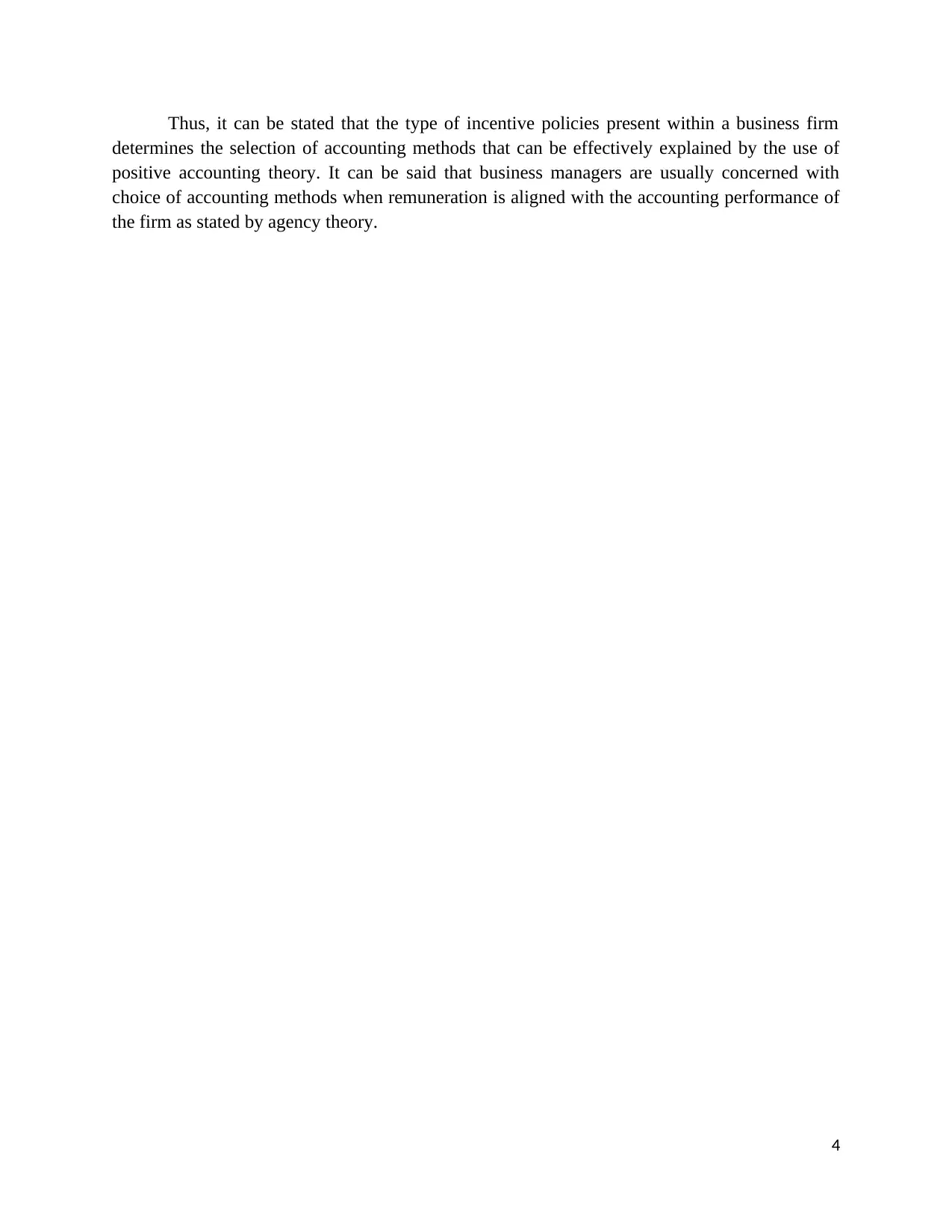
Thus, it can be stated that the type of incentive policies present within a business firm
determines the selection of accounting methods that can be effectively explained by the use of
positive accounting theory. It can be said that business managers are usually concerned with
choice of accounting methods when remuneration is aligned with the accounting performance of
the firm as stated by agency theory.
4
determines the selection of accounting methods that can be effectively explained by the use of
positive accounting theory. It can be said that business managers are usually concerned with
choice of accounting methods when remuneration is aligned with the accounting performance of
the firm as stated by agency theory.
4
Paraphrase This Document
Need a fresh take? Get an instant paraphrase of this document with our AI Paraphraser
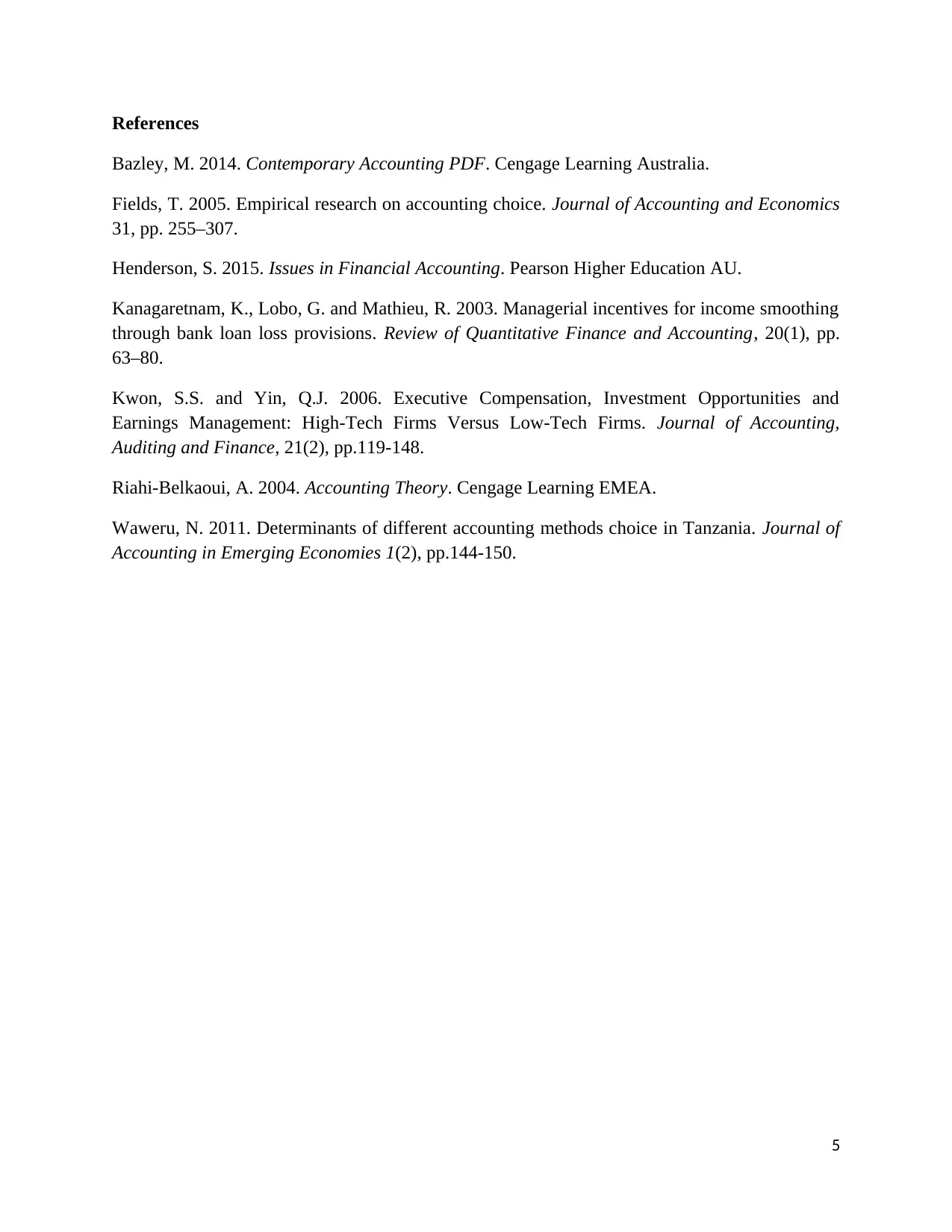
References
Bazley, M. 2014. Contemporary Accounting PDF. Cengage Learning Australia.
Fields, T. 2005. Empirical research on accounting choice. Journal of Accounting and Economics
31, pp. 255–307.
Henderson, S. 2015. Issues in Financial Accounting. Pearson Higher Education AU.
Kanagaretnam, K., Lobo, G. and Mathieu, R. 2003. Managerial incentives for income smoothing
through bank loan loss provisions. Review of Quantitative Finance and Accounting, 20(1), pp.
63–80.
Kwon, S.S. and Yin, Q.J. 2006. Executive Compensation, Investment Opportunities and
Earnings Management: High-Tech Firms Versus Low-Tech Firms. Journal of Accounting,
Auditing and Finance, 21(2), pp.119-148.
Riahi-Belkaoui, A. 2004. Accounting Theory. Cengage Learning EMEA.
Waweru, N. 2011. Determinants of different accounting methods choice in Tanzania. Journal of
Accounting in Emerging Economies 1(2), pp.144-150.
5
Bazley, M. 2014. Contemporary Accounting PDF. Cengage Learning Australia.
Fields, T. 2005. Empirical research on accounting choice. Journal of Accounting and Economics
31, pp. 255–307.
Henderson, S. 2015. Issues in Financial Accounting. Pearson Higher Education AU.
Kanagaretnam, K., Lobo, G. and Mathieu, R. 2003. Managerial incentives for income smoothing
through bank loan loss provisions. Review of Quantitative Finance and Accounting, 20(1), pp.
63–80.
Kwon, S.S. and Yin, Q.J. 2006. Executive Compensation, Investment Opportunities and
Earnings Management: High-Tech Firms Versus Low-Tech Firms. Journal of Accounting,
Auditing and Finance, 21(2), pp.119-148.
Riahi-Belkaoui, A. 2004. Accounting Theory. Cengage Learning EMEA.
Waweru, N. 2011. Determinants of different accounting methods choice in Tanzania. Journal of
Accounting in Emerging Economies 1(2), pp.144-150.
5
1 out of 5
Related Documents
Your All-in-One AI-Powered Toolkit for Academic Success.
+13062052269
info@desklib.com
Available 24*7 on WhatsApp / Email
![[object Object]](/_next/static/media/star-bottom.7253800d.svg)
Unlock your academic potential
Copyright © 2020–2026 A2Z Services. All Rights Reserved. Developed and managed by ZUCOL.





